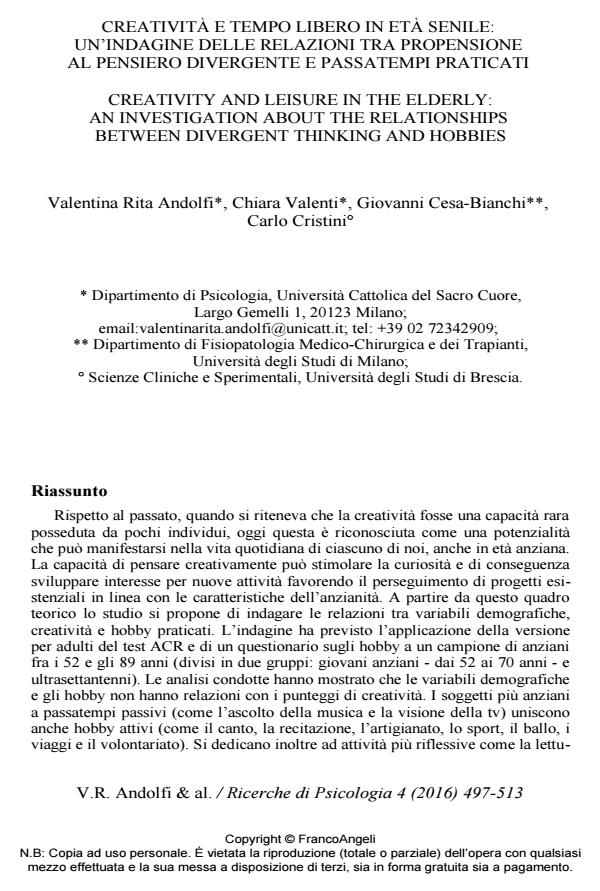Creativity and leisure in the elderly: an investigation about the relationships between divergent thinking and hobbies
Journal title RICERCHE DI PSICOLOGIA
Author/s Valentina Rita Andolfi, Chiara Valenti, Marcello Cesa-Bianchi, Carlo Cristini
Publishing Year 2017 Issue 2016/4
Language Italian Pages 17 P. 497-513 File size 219 KB
DOI 10.3280/RIP2016-004003
DOI is like a bar code for intellectual property: to have more infomation
click here
Below, you can see the article first page
If you want to buy this article in PDF format, you can do it, following the instructions to buy download credits

FrancoAngeli is member of Publishers International Linking Association, Inc (PILA), a not-for-profit association which run the CrossRef service enabling links to and from online scholarly content.
Compared to the past, when creativity was considered an ability possessed by a few individuals, now it is recognized as a relevant skill in daily life, even in old age. Creative thinking can stimulate curiosity and, as a result, enhance interest in new activities, and foster the pursuit of life plans in line with the characteristics of seniority. Starting from this theoretical framework, the study aims at investigating the relationships among demographic variables, creativity, and hobbies. The adult version of the ACR test and questionnaire about hobbies were administered to a sample of elderly, aged 52-89 (divided into two groups: young elders from 52 to 70 and old elders, aged 70 or over). Analyses showed that demographic variables and hobbies do not have relations with creativity scores. The eldest participants practice both passive hobbies (such as listening to the radio and music and watching TV) as well as active hobbies (like singing, acting, crafts, sports, dancing, traveling, and volunteering). They spend time in more reflective activities, such as reading, crosswords, and religion. The youngest participants prefer active and creative pastimes, sometimes even technological ones. An encouraging picture emerges, where those over 70 still want to learn and contribute to the proper functioning of society, devoting attention to their affects but also to their own life experiences. The youngest, recently retired or still professionally engaged, dedicate less time to hobbies.
Keywords: Creativity, divergent thinking, ageing, hobbies, leisure.
- Le concezioni dell'apprendimento negli anziani ospedalizzati Rosa Cera, Alessandro Antonietti, in RICERCHE DI PSICOLOGIA 4/2019 pp.565
DOI: 10.3280/RIP2018-004002 - Potenziare la flessibilità cognitiva in età anziana: gli effetti di un training Sabrina Rago, Valentina Rita Andolfi, Alessandro Antonietti, Giuseppe Iannoccari, Nicoletta Porcu, Chiara Valenti, in RICERCHE DI PSICOLOGIA 2/2020 pp.691
DOI: 10.3280/RIP2020-002011
Valentina Rita Andolfi, Chiara Valenti, Marcello Cesa-Bianchi, Carlo Cristini, Creativita e tempo libero in eta senile: un’indagine delle relazioni tra propensione al pensiero divergente e passatempi praticati in "RICERCHE DI PSICOLOGIA " 4/2016, pp 497-513, DOI: 10.3280/RIP2016-004003